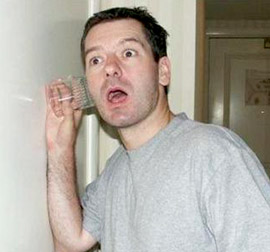Is eavesdropping wrong?
When Gordon Brown retreated to the back seat of his prime ministerial
Jaguar after a verbal tussle with a voter on the streets of Rochdale,
his unguarded remark became, for some, the tipping point in this year's
general election campaign.
 The comment, made in private, was picked up on a radio microphone and
broadcast around the globe. The comment, made in private, was picked up on a radio microphone and
broadcast around the globe.
Mr Brown embarked on a humiliating damage-limitation exercise while
his political opponents sat back and enjoyed the spectacle.
But consider this - everyone who tuned into the coverage of the story
was indulging in the less than honourable practice of eavesdropping.
Many would disagree, or defend their actions in this case. As the
then-prime minister, Mr Brown should have expected the highest level of
scrutiny, they may argue.
But to John Locke, a professor of linguistics in New York, there was
nothing to defend. Eavesdropping may be socially unacceptable in many
quarters, but it is hardwired into us.
"I think of social eavesdropping, 'recreational eavesdropping' if you
like, as actually irrepressible. We have an evolved appetite for
information about the personal and private lives of others."
Professor Locke has been studying the history of the subject for a
new book - Eavesdropping, a History.
The term is not easy to define. One man's eavesdropping is another's
innocent overhearing, and yet another's snooping.
But what is certain, says Prof Locke, is humans are not alone in
feeling a need to listen in to the conversations of others.
"I always thought of eavesdropping as a process of acquiring
information while hiding but birds, fish, lizards - all animals
eavesdrop," he says.
"They simply tune in to symbols and behaviour that are not
necessarily intended for their consumption. In fact, if they didn't do
that, they wouldn't able to live, wouldn't be able to feed themselves or
to avoid being eaten."
For humans, however, it became an evolutionary need in
hunter-gatherer times, when privacy was almost unheard of.
Life was conducted communally, to such an extent that anyone who
wanted privacy was viewed with suspicion, their private conversations
listened to for the survival of the group.
"We've had a multi-millennial contest between individuals and the
growing importance of privacy in the world," says Prof Locke.
Snoopers "It's a condition that didn't exist 10,000 years ago or
5,000 years ago yet it has gradually become a right protected by law."
By the 15th and 16th centuries, privacy and prying were competing
behaviours.
Eavesdroppers would be prosecuted and yet, the evolving judicial
system was rewarding snoopers for the evidence they were able to offer
court hearings, in cases such as those dealing with adultery. It was
both vital and vilified by the legal system, says Prof Locke.
These days, the plethora of new communications technologies has
presented eavesdroppers with a previously unimaginable range of prying
options.
"The mobile phone makes us all inadvertent eavesdroppers which I
think many of us resent," says John Mullan, an English professor at
University College London.
"We don't necessarily want to be intimate with other people's
intimacies."
Manifested in countless celebrity magazines and gossip websites, the
desire to eavesdrop has become insatiable, says Prof Locke. And a
citizen's desire and right tor privacy seems to be entirely at odds with
the technological revolution.
Literary eavesdroppers Facebook founder Mark Zuckerberg said, earlier
this year. that sharing more information had become a "social norm [and
is] just something that has evolved over time". But if everyone is
revealing more and more of their private lives, why has eavesdropping
gained such a negative reputation?
Historically in literature, those who eavesdrop are given a hard
time: the stirring of Heathcliff's bitterness in Wuthering Heights was
caused by a half-heard conversation; Shakespeare used eavesdropping to,
amongst other things, seal the fate of his tragic hero Othello. Here it
seems that acting without full access to the facts can only be a bad
thing.
But more contemporary examples appear to require and even encourage
eavesdropping: passengers on trains are asked to vigilant, just in case
they see or hear anything suspicious; neighbourhood watch schemes were
established to increase community vigilance; social media relies on the
desire of fans and followers to "snoop" around profiles, feeds and
entries, though it is already in the public domain.
It is this desire for finding out the unknown, the secrets that the
powerful keep which people desire.
Prof Locke called this a huge game of hide and seek, with people more
than happy to give certain bits of their personality away - those that
portray them in a positive light - while wishing to keep the less
flattering bits under wraps. So, what about the phone tapping carried
out by The News of the World? The Sunday newspaper's royal
correspondent, and a private investigator working for him, were jailed
for listening into the voicemails of celebrities.
'Hired eavesdroppers' Fresh accusations have centred on the paper's
former editor, Andy Coulson, who is Prime Minister David Cameron's
communications director. Mr Coulson denies he knew about phone tapping
techniques on the paper.
While not wanting to be drawn on the specifics of the case, Prof
Locke cites paparazzi who, he says, are "basically hired eavesdroppers".
"They do our eavesdropping for us and that's an industry now. A
single photo, if it's the right photo, can be enough to feed a family of
four for a year."
But he is sure that eavesdropping is not necessarily a bad thing:
"Think about the fact you have to tell children: 'Don't stare and
don't eavesdrop.' Why do we have to tell them that? Because it's a
natural thing to do. And, what you learn is 'don't obviously stare and
don't obviously eavesdrop'.
"We've become very good at this stuff because the fact is we cannot
imagine a world where this sort of behaviour is not possible."
- BBC
|

